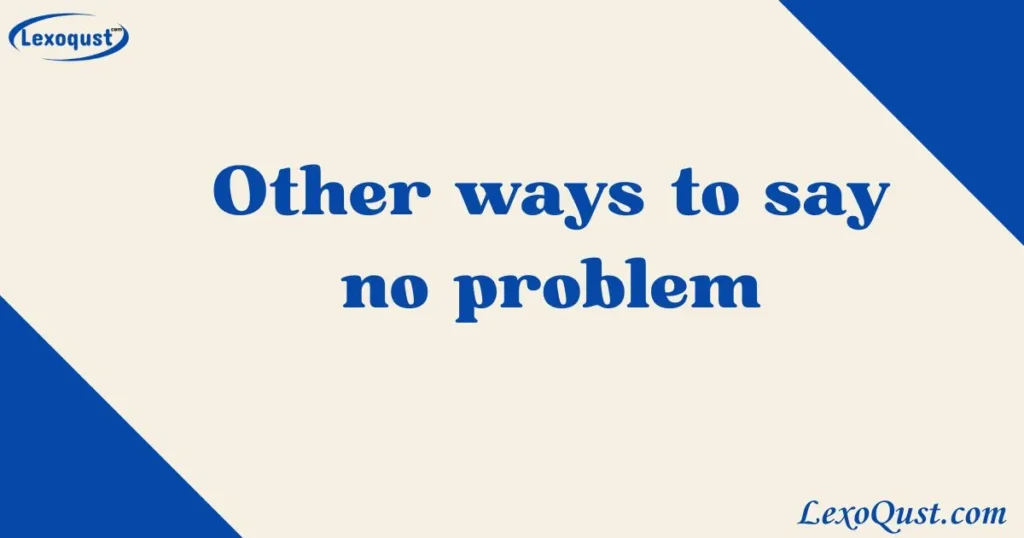In everyday writing and conversation, how we respond matters just as much as what we say. The phrase “no problem” has become a go-to reply for showing ease or willingness, but it can sometimes feel vague, overly casual, or even dismissive in certain contexts.
Just like the often-repeated phrase “the author states,” which can come off as mechanical in essays or reports, “no problem” may not always capture the right tone or intent. A more thoughtful choice of words can help you communicate with greater clarity, warmth, and professionalism.
This guide offers 35 alternative ways to say “no problem”, complete with examples to show you how each phrase works in real situations. Whether you’re writing a formal email, responding in a customer service chat, or casually texting a friend, these expressions will help you fine-tune your language.
Expanding your vocabulary isn’t just about sounding better—it’s about connecting more effectively with your audience and leaving a positive impression in every interaction.
What Does “No Problem” Mean?
“No problem” is a casual way to say that something was not an inconvenience. It’s often used in response to “thank you” to reassure the other person that their request or gratitude didn’t cause any trouble. It communicates ease, cooperation, and friendliness.
When to Use “No Problem”
You can use “no problem” in informal conversations—like with friends, coworkers, or in relaxed customer service settings. It’s best suited for situations where you want to sound approachable and easygoing, such as when helping someone or responding to a thank-you.
Is It Professional/Polite to Say “No Problem”?
While “no problem” is generally polite, it may come across as too casual or dismissive in very formal settings. In professional communication, especially in emails or with clients, alternatives like “You’re welcome”, “My pleasure”, or “Glad to help” often sound more polished and respectful.
1. “My Pleasure”
Meaning:Shows sincere enjoyment in helping or doing something for someone.
Definition:A courteous way to respond to “thank you,” indicating that the action brought you personal satisfaction.
Tone:
Polite, warm, and gracious.
Example:
“Thanks for walking me through the process.” – “My pleasure!”
Explanation:This phrase adds professionalism and elegance, making it ideal for both formal and friendly communication.
Purpose and Personalization:Best for customer service, emails, or polite conversations. You can make it even warmer by pairing it with the task: “It was my pleasure to assist with your request.”
2. “Happy to Help”
Meaning:Expresses cheerfulness and willingness in providing support.
Definition:A friendly and approachable response that emphasizes eagerness to assist.
Tone:Encouraging and positive.
Example:“Thanks for sending over the files.” – “Happy to help!”
Explanation:It feels welcoming and proactive, showing you’re supportive and cooperative.
Purpose and Personalization:Perfect for team communication or customer interaction. Can be personalized to context, e.g., “Always happy to help with your writing projects!”
3. “No Worries”
Meaning:Downplays inconvenience and reassures the other person that all is well.
Definition:A relaxed way to say everything is fine or their request was no trouble.
Tone:Casual and easygoing.
Example:“Sorry for the last-minute request.” – “No worries!”
Explanation:This phrase creates a relaxed tone, often used to build comfort and reduce tension.
Purpose and Personalization:Great for informal writing or conversation. Swap with “Not a problem” or “It’s okay” in more professional settings.
4. “Glad to Assist”

Meaning:Highlights that helping someone was done with a sense of responsibility and contentment.
Definition:A formal phrase expressing contentment in being helpful.
Tone:Professional and polite.
Example:“Thanks for clarifying the steps.” – “Glad to assist!”
Explanation:It sounds competent and service-minded, making it excellent for formal communication.
Purpose and Personalization:Use in client-facing emails, official documents, or support roles. Add: “Glad to assist you anytime you need.”
5. “Of Course”
Meaning:Indicates that helping or agreeing was natural and expected.
Definition:An affirmative, courteous way to say you were happy to help or agree.
Tone:Assuring and supportive.
Example:“Can I ask you another question?” – “Of course!”
Explanation:It assures the recipient that their request is welcomed, often strengthening trust.
Purpose and Personalization:Good in both casual and formal writing. For a professional tone, follow with a statement: “Of course, let me know what you need.”
6. “Absolutely”
Meaning:Confirms agreement or willingness without hesitation.
Definition:A strong, affirmative response that emphasizes readiness or approval.
Tone:Confident and enthusiastic.
Example:“Could you help me with this?” – “Absolutely!”
Explanation:It conveys certainty and positivity, reassuring the reader of your commitment.
Purpose and Personalization:Best in supportive or enthusiastic responses. You can personalize with context: “Absolutely, I’ll take care of that right away.”
7. “Not a Problem”
Meaning:Assures the person that their request wasn’t inconvenient.
Definition:A slight variation of “no problem,” still casual but slightly more formal.
Tone:Relaxed and reassuring.
Example:“Thanks for fixing that so quickly.” – “Not a problem.”
Explanation:It helps smooth communication while sounding approachable.
Purpose and Personalization:Use in semi-formal conversations or customer support. Replac “My pleasure” in formal situations.
8. “You Got It”
Meaning:A casual way to affirm that a request will be completed.
Definition:A confident and friendly phrase that means “I’ll take care of it.”
Tone:Energetic and informal.
Example:“Can you email that by noon?” – “You got it!”
Explanation:It adds friendliness and approachability, especially in teams or peer conversations.
Purpose and Personalization:Great for quick replies. Personalize it with task-specific context: “You got it—on my list now!”
9. “Sure Thing”
Meaning:Enthusiastically agrees to a request.
Definition:An informal way to say “yes” or “I’ll do that.”
Tone:Casual and friendly.
Example:“Mind if I borrow your notes?” – “Sure thing!”
Explanation:It gives a confident, upbeat reply that feels personal and genuine.
Purpose and Personalization:Use in relaxed settings. For a more formal tone, try “Certainly” or “Absolutely.”
10. “Consider It Done”

Meaning:Shows promptness and confidence in fulfilling a request.
Definition:A phrase that guarantees immediate action.
Tone:Assured and professional.
Example:“Can you send that report today?” – “Consider it done.”
Explanation:It offers certainty, which builds trust in both personal and business writing.
Purpose and Personalization:Effective in leadership or support roles. Use for quick action items or direct tasks.
11. “I’m Here for You”
Meaning:Offers emotional or practical support.
Definition:A reassuring phrase expressing availability and care.
Tone:Comforting and empathetic.
Example:“Thanks for listening.” – “I’m here for you.”
Explanation:This phrase strengthens connection and builds emotional trust.
Purpose and Personalization:Best for personal messages. For formal tone, rephrase as “Please let me know how I can assist.”
12. “Don’t Mention It”
Meaning:Downplays a favor or help to show it was no burden.
Definition:A modest way to respond to thanks.
Tone:Humble and polite.
Example:“Thank you for covering for me.” – “Don’t mention it.”
Explanation:It reduces any sense of obligation and keeps things relaxed.
Purpose and Personalization:Use in friendly emails or conversations. For professional use, pair with “Glad to help.”
13. “It’s All Good”
Meaning:Expresses that everything is fine—no need to worry.
Definition:A laid-back reply to minimize concern.
Tone:Casual and calming.
Example:“Sorry for the mix-up!” – “It’s all good.”
Explanation:Helps lighten the mood and reassure the other person.
Purpose and Personalization:Use in informal exchanges. Avoid formal writing—use “No problem at all” instead.
14. “No Problem at All”
Meaning:Strengthens the reassurance that something wasn’t an issue.
Definition:An extended, more polite version of “no problem.”
Tone:Courteous and mild.
Example:“Thanks for your help today.” – “No problem at all!”
Explanation:It softens your tone and makes the response feel thoughtful.
Purpose and Personalization:Use in semi-formal or polite interactions. For higher formality, try “You’re very welcome.”
15. “I’m on It”
Meaning:Shows initiative and readiness to act.
Definition:A confident way to say you’re already handling something.
Tone:Assertive and proactive.
Example:“We need that update ASAP.” – “I’m on it!”
Explanation:Gives confidence that tasks are being handled without delay.
Purpose and Personalization:Use in fast-paced settings. For formal writing, say “I’ve already begun addressing this.”
16. “Count on Me”
Meaning:Expresses dependability and support.
Definition:An encouraging way to show that someone can rely on you.
Tone:Supportive and assuring.
Example:“Can I ask for your help later?” – “Count on me.”
Explanation:It’s a strong personal commitment that builds trust.
Purpose and Personalization:Best in mentorship or personal settings. Use “You can depend on me” for a formal tone.
17. “I’ve Got Your Back”
Meaning:Conveys support, protection, or teamwork.
Definition:An informal way to express solidarity and help.
Tone:Reassuring and loyal.
Example:“This project’s intense.” – “No worries—I’ve got your back.”
Explanation:Creates a sense of partnership and unity.
Purpose and Personalization:Use in teams or friendships. For formal writing, say “I fully support you.”
18. “No Trouble at All”
Meaning:Reassure the other person that helping was effortless.
Definition:A polite phrase minimizing any burden.
Tone:Gentle and courteous.
Example:“Thanks for going out of your way.” – “No trouble at all!”
Explanation:Reduces perceived obligation or guilt.
Purpose and Personalization:Use in polite emails or notes. Replace with “Not an issue whatsoever” for added variation.
19. “I’m More Than Happy to Help”
Meaning:Adds extra warmth to your willingness to assist.
Definition:An expressive phrase that amplifies your eagerness.
Tone:Sincere and generous.
Example:“Thanks again for staying late.” – “I’m more than happy to help.”
Explanation:Enhances your message’s emotional tone.
Purpose and Personalization:Use when writing thank-you responses or customer care. It shows an above-and-beyond attitude.
20. “Consider It My Honor”

Meaning:Shows deep respect or gratitude for being asked to help.
Definition:An elevated way of accepting a request or acknowledging thanks.
Tone:Formal and respectful.
Example:“Thank you for speaking at the event.” – “Consider it my honor.”
Explanation:Adds dignity and humility to your response.
Purpose and Personalization:Use in formal emails or acknowledgments. For casual tone, say “It was truly my pleasure.”
21. “It’s My Joy”
Meaning:Emphasizes personal happiness in helping.
Definition:A heartfelt phrase that shows fulfillment from giving or supporting.
Tone:Warm and emotional.
Example:“I’m grateful for your support.” – “It’s my joy.”
Explanation:Adds a personal, uplifting note to your response.
Purpose and Personalization:Great for personal letters or caregiving roles. Pair with specifics for depth: “It’s my joy to be part of your journey.”
22. “I’m at Your Service”
Meaning:Communicates a respectful readiness to help.
Definition:A formal way to show availability and willingness.
Tone:Professional and polite.
Example:“If you need anything else…” – “I’m at your service.”
Explanation:Offers support while maintaining professional distance.
Purpose and Personalization:Ideal in customer service or hospitality writing. Use with a polite tone in formal emails.
23. “You’re Welcome”
Meaning:A classic, direct way to accept thanks.
Definition:A standard reply to gratitude.
Tone:Neutral and polite.
Example:“Thanks for the update.” – “You’re welcome.”
Explanation:Simple, timeless, and universally accepted.
Purpose and Personalization:Fits all tones and settings. You can warm it up: “You’re very welcome!”
24. “I’m Glad to Help”
Meaning:Shows pleasure and gratitude in being useful.
Definition:A kind phrase expressing satisfaction from assisting.
Tone:Friendly and content.
Example:“Thanks for making time.” – “I’m glad to help!”
Explanation:Makes your response
feel genuine and intentional.
Purpose and Personalization:Perfect for emails, support replies, or friendly chats. Add detail to connect it: “I’m glad to help with your outline.”
25. “I’m Here to Help”
Meaning:Reinforces your supportive presence.
Definition:Assures the person that you’re available to assist.
Tone:Reassuring and open.
Example:“Sorry for asking again…” – “No problem, I’m here to help.”
Explanation:Creates psychological safety and encouragement.
Purpose and Personalization:Great for team support or client communication. Make it personal: “I’m here to help you succeed.”
26. “You’re in Good Hands”

Meaning:Assure someone they can relax or trust you.
Definition:A comforting phrase showing confidence in your care or abilities.
Tone:Reassuring and calm.
Example:“Will it be handled properly?” – “You’re in good hands.”
Explanation:It reduces anxiety and builds trust.
Purpose and Personalization:Use in service or leadership settings. Personalize with context: “You’re in good hands—we’ve done this many times.”
27. “Let Me Know How I Can Help”
Meaning:Shows openness and willingness to support.
Definition:A proactive invitation to assist further.
Tone:Supportive and engaging.
Example:“Thanks for everything!” – “Let me know how I can help going forward.”
Explanation:Keeps communication open and invites collaboration.
Purpose and Personalization:Use at the end of messages or support exchanges. Tailor it: “Let me know how I can help with revisions.”
28. “I Appreciate Your Thanks”

Meaning:Acknowledges and reciprocates gratitude.
Definition:A mature, thoughtful way to return appreciation.
Tone:Gracious and calm.
Example:“Thanks again for your help.” – “I appreciate your thanks.”
Explanation:It turns a thank-you into a shared moment of respect.
Purpose and Personalization:Use in thoughtful or formal writing. You can soften it: “I truly appreciate your kind words.”
Learn More: Other ways to say “Happy Easter”
29. “I’m Always Here for You”
Meaning:Reinforces long-term support and dependability.
Definition:A caring statement of consistent availability.
Tone:Warm and loyal.
Example:“You’ve done so much for me.” – “I’m always here for you.”
Explanation:Deepens emotional trust and bonds.
Purpose and Personalization:Great for personal or mentorship messages. Make it situational: “I’m always here for you—just call.”
30. “It’s Nothing”
Meaning:Minimizes the effort to emphasize generosity.
Definition:A modest way of saying the action required no effort.
Tone:Humble and relaxed.
Example:“Thanks for doing that so fast!” – “It’s nothing.”
Explanation:This keeps the tone light and generous.
Purpose and Personalization:Use casually. For formal tone, try “It was no trouble at all.”
Read More: Other ways to say “Looking Forward to Seeing You”
31. “It Was the Least I Could Do”
Meaning:Express humility while acknowledging your contribution.
Definition:A modest phrase that shows you were glad to help, even if you feel it wasn’t a big effort.
Tone:Humble and sincere.
Example:“Thanks for stepping in to help at the last minute.” – “It was the least I could do.”
Explanation:This phrase shows gratitude and downplays your role, making your support feel generous and thoughtful.
Purpose and Personalization:Use in thoughtful messages, especially after helping in tough times. Personalize it with a follow-up, like “Let me know if I can do more.”
32. “It Was Nothing, Really”
Meaning:Downplays the action taken to make the other person feel at ease.
Definition:A casual and humble way to dismiss a compliment or thanks.
Tone:Modest and informal.
Example:“I can’t thank you enough for covering my shift.” – “It was nothing, really.”
Explanation:Helps maintain a humble tone while still accepting gratitude.
Purpose and Personalization:Ideal for friendly interactions. For a more formal tone, shift to “It was no trouble at all.”
33. “Anything for You”
Meaning:Communicates closeness and loyalty, showing you’d go out of your way for someone.
Definition:An affectionate response to a favor or request.
Tone:Warm and personal.
Example:“Thanks for helping me prep for the interview.” – “Anything for you!”
Explanation:Adds emotional value and deepens personal connection.
Purpose and Personalization:Great for friends, family, or close colleagues. Make it personal: “Anything for you—you’ve helped me so much too!”
34. “All in a Day’s Work”
Meaning:Frames your action as routine or part of your role.
Definition:A modest way of saying that what you did was part of your job or daily duties.
Tone:Professional yet laid-back.
Example:“Thanks for staying late to finish the report.” – “All in a day’s work.”
Explanation:Shows responsibility and humility without sounding dismissive.
Purpose and Personalization:Use in workplace communication. You can pair it with appreciation: “All in a day’s work—glad I could contribute.”
35. “Just Doing My Part”
Meaning:Conveys teamwork and a shared sense of responsibility.
Definition:A phrase that shows your contribution is part of a bigger effort.
Tone:Supportive and collaborative.
Example:“Thank you for helping organize the event.” – “Just doing my part!”
Explanation:It encourages unity and shared success, which is great in group settings.
Purpose and Personalization:Use in group projects or volunteer work. Personalize with the context: “Just doing my part to support the team.”
Conclusion
Choosing the right words—like finding other ways to say “no problem”—can transform ordinary responses into meaningful connections. Thoughtful language enhances clarity, tone, and relatability, whether you’re writing a blog post, academic paper, or personal letter.
I encourage you to explore these alternatives and apply them to your writing for greater warmth and authenticity. Language is powerful—make it work for you. I truly hope this guide becomes a practical resource in your journey toward more expressive communication. Let your voice reflect both professionalism and personality—one phrase at a time.

Hi! I’m Amelia Ashford, the admin of Lexoqust.com. Here, we dive deep into the world of synonyms to help you express yourself better.From everyday words to advanced vocabulary, Lexoqust makes your writing richer and more refined.



